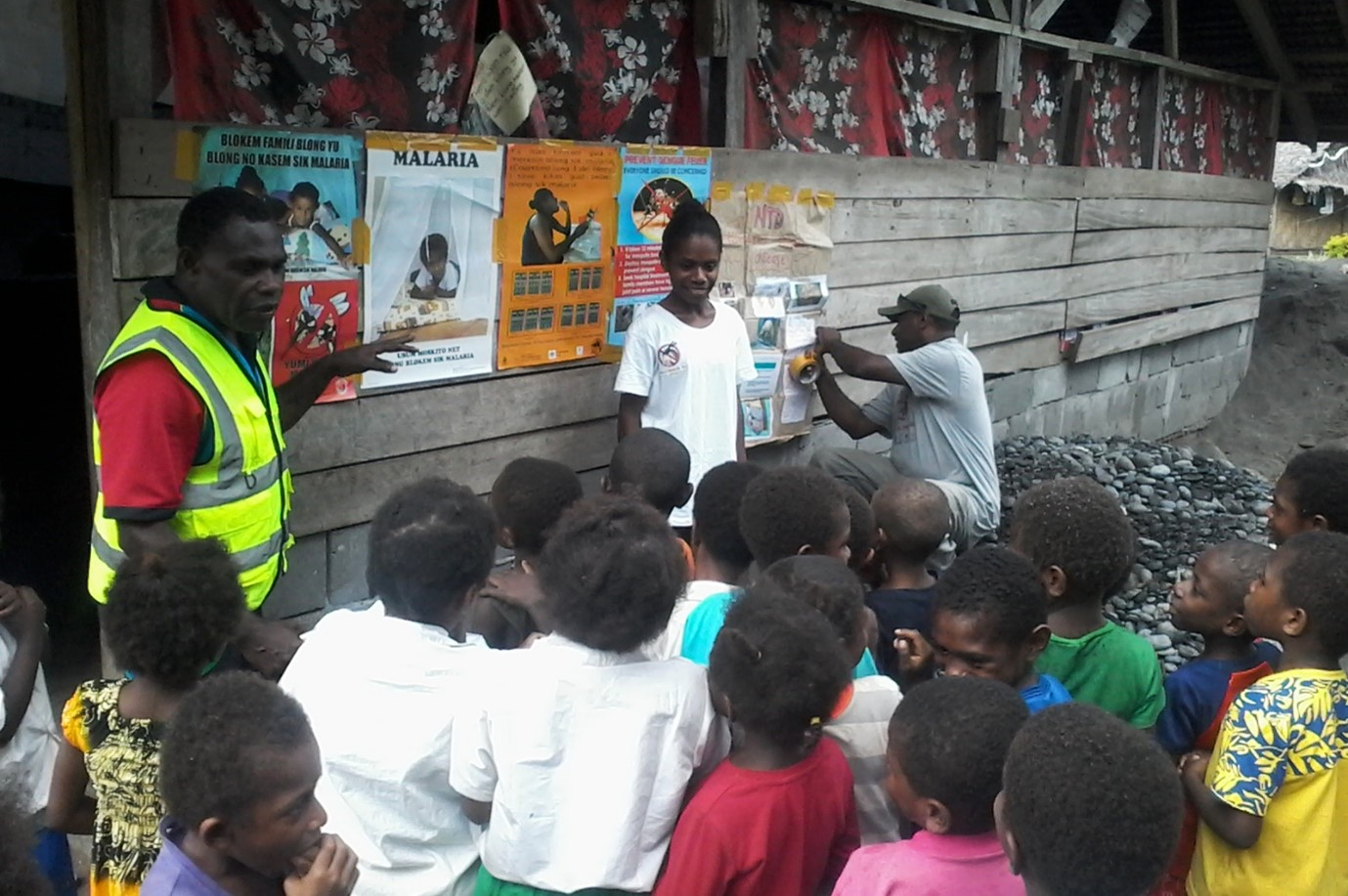The Acting Malaria Supervisor conducts a community outreach and awareness session at a local school in Torba province. (Photo: Ministry of Health)
Vanuatu is truly an amazing country with great people and pristine nature. The island archipelago is dotted with active volcanoes, rugged mountains, waterfalls and rare species of plants and animals. Tourism, agriculture and a thriving offshore financial sector make up the heartbeat of the country’s economy.
Unfortunately, there are underlying issues – in particular, public health challenges, as well as the burden of sea level rise and climate change which often causes severe natural disasters and increased temperatures, rainfall and humidity (optimal conditions for mosquito-borne diseases to thrive) – that pose a threat to the country’s economic growth and long-term human development.
For decades, malaria has been one of the leading causes of death and disease in Vanuatu. In 1990, this mosquito-borne disease infected an estimated 198 per 1,000 people and caused many deaths, and as recently as 2010 it was among the top five notifiable diseases nationally.
However, thanks to scaled-up coordinated efforts by a group of likeminded partners, remarkable successes in the malaria response have been achieved in Vanuatu in recent years. Since 2010, there has been a 95 percent reduction in malaria burden. In 2021, there were just 322 malaria cases nationwide as compared to 502 in 2020. And since 2012 there have been no reported deaths.
The current trajectory points to the realization of the National Malaria Strategic Plan’s vision of a “malaria-free Vanuatu, contributing to the good health and well-being of the population”. The efforts are being driven by the Ministry of Health and its National Malaria Programme, together with development partners, including the World Health Organization, the Australian Department of Foreign Affairs and Trade, Rotarians Against Malaria, the Global Fund to fight AIDS, Tuberculosis and Malaria and the United Nations Development Programme (UNDP), working in close collaboration with National and Provincial health services, local communities and others.
Since 2015, UNDP has served as Principal Recipient of a programme supported by the Global Fund seeking to achieve zero indigenous malaria cases in all provinces by the end of 2023 and obtain WHO certification of malaria-free status by 2026.
A new challenge has recently emerged, however, that threatens to upend the progress of programme implementation in Vanuatu.
For the past several weeks I’ve been on mission in Port Vila, the capital city, supporting the UNDP and Ministry of Health’s malaria programme, as well as responses to HIV and tuberculosis. During this time, Vanuatu has been in the midst of its first real surge of COVID-19 (prior to this, the country’s tight border and public health restrictions had kept it largely at bay).
Since early March, there has been rapid community spread of COVID-19. The nation has been under alert level three restrictions since 7 March and six provinces (Malampa, Penama, Sanma, Shefa, Tafea and Torba) have been placed under a 6pm to 6am curfew.
Public health officials and health workers are working against the odds to ensure the public is protected, and simultaneously that other crucial health programmes, such as the malaria programme, continue without disruption.
The emergency situation has drawn a majority of public health resources away from the routine malaria response. For instance, the national malaria programme is operating at sub-optimal level with limited staffing both at national and provincial levels due to most staff being diverted to support the national COVID response. Despite this, the malaria team is harnessing innovative approaches in its community advocacy, case investigations and reporting to continue with its most essential activities and ensure there is no re-establishment of malaria transmission. Once restrictions are relaxed, the programme is preparing to rapidly re-engage with its distribution of long-lasting insecticidal mosquito nets and conducting of indoor residual spraying in high burden areas and ensure testing of all cases of fever using rapid diagnostic tests, with treatment and care for all confirmed cases.
This work is challenging in the current circumstances, but vitally important.
Concurrently, UNDP through partnership with Global Fund has been able to support the country’s COVID-19 pandemic response by quickly delivering stocks of needed medical personal protective equipment. UNDP is also engaged in ongoing discussions with the Heads of the Ministry of Health and National Malaria Programme, on ways of supporting continued access to services both at national and provincial levels, to leave no one behind during the national COVID-19 outbreak and ongoing battle with malaria.
I know we can defeat malaria. Only through strong partnerships, and urgent and concerted action can Vanuatu overcome its public health challenges and achieve its goal of eliminating this disease. I am confident we will win this fight and get back on track toward our common vision: a malaria-free Vanuatu which will ultimately lead to a malaria-free world.

 Locations
Locations

